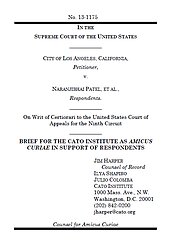City of Los Angeles v. Patel
Learn more about Cato’s Amicus Briefs Program.
Los Angeles, like many cities, has long had an ordinance commanding hotel operators to keep detailed registers recording information on their guests. Not a huge deal—many businesses are required for one reason or another to keep certain records. The problem is that the L.A. ordinance also makes it a misdemeanor anytime a hotel operator refuses to obey a police command to produce this register for inspection. Often, these inspections came in the middle of the night, with officers barging into the family quarters of small, family-run hotels and motels. They’ve even happened several times in the same night. Indeed, they could happen however often the police like, because there are no legal limits, warrant requirements, or procedural limitations on the officers’ discretion. The city believes that these surprise inspections deter crime and could also be useful to catch terrorists. The hoteliers feel differently; a group of them joined together to fight back against the ordinance, arguing that the suspicionless searches it authorizes violate their Fourth Amendment rights. A federal district court upheld the ordinance, as did a three-judge panel of the U.S. Court of Appeals for the Ninth Circuit. On rehearing before the full Ninth Circuit, however, the “en banc” court found that the police’s non-consensual inspection of guest records is a search under either the property rights-based approach of United States v. Jones (the 2012 GPS-tracking case) or the traditional privacy-based approach of Katz v. United States (the 1967 phone-booth case), and that—at a minimum—an administrative-search scheme must require an opportunity for pre-compliance judicial review. At the city’s request, the Supreme Court has agreed to hear the case, and Cato has filed a brief in support of the hotel owners. The first part of our brief urges the court to look more broadly than just at “privacy” and Katz’s outdated “reasonable expectation of privacy” test when applying the Fourth Amendment. The second part argues that the city’s warrantless-search scheme establishes a multitude of separate searches and seizures, which, taken together, clearly go beyond the ambit of a public-welfare administrative purpose. In the third part, we argue that because the ordinance lacks a valid public-welfare purpose, it is not an administrative search, and that therefore its lack of a warrant requirement or procedural limitations on officer discretion makes the searches unreasonable and thus unconstitutional. If L.A. prevails here, it seems fairly likely that we will end up seeing more and more businesses conscripted against their will into the ever-growing army of police surveillance. Los Angeles is certainly not the only city to have tried such a scheme. We urge the Supreme Court to stand up for the Fourth Amendment’s protection of “persons, houses, papers, and effects” and make it the last.

This work is licensed under a Creative Commons Attribution-NonCommercial-ShareAlike 4.0 International License.
